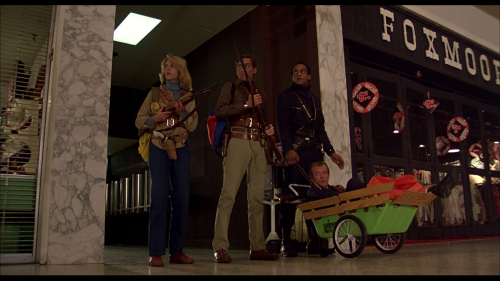
The main characters in Dawn of the Dead, off on a shopping trip
How can we stop consumerism consuming our lives?
For those of you who’ve seen the classic zombie movie Dawn Of The Dead (spoiler alert), you’ll know it critically comments on consumerism and excess. Trapped conveniently in a deserted American mall during a zombie apocalypse, our heroes can essentially ‘buy’ anything they want. They’ve found a shopping heaven which can provide them with ‘everything they need’.
I’m sure 1000 analyses of the film have been done, commenting on the draw of shopping, even when society has broken down and money is irrelevant. They may be another 1000 covering the contrast between the seeming decadence of the characters lifestyles against the hollowness of their mundane and existence (being a metaphor for our modern isolated way of life). However, the one thing I’d like to focus in on is time – Time spent consuming.
In Dawn Of The Dead, even though they don’t spend money, the characters spend literally all their time ‘shopping’. Everything is free, but they take way more than they need and continually upgrade when they find better stuff in another part of the multi-storey complex.
But how are we similar to those trapped in a mall by the undead? Well, even though the apocalypse is nigh, and lifespans short, these characters choose to devote what time they have left to constant acquisition. On a longer timeline, we do the same thing when we buy things we don’t need. Our time is eaten up by it. Life is short, and each unnecessary purchase robs us of hours spent doing the following:
- earning the money for the purchase
- considering a purchase
- shopping
- dealing with the thing we’ve bought but don’t need – storing it, maintaining it or getting rid of it (which may also eat up more money).
But what about the time spent buying things we do need? I still spend a lot of time on consuming, even as a minimalist. How is this possible?
Three main reasons:
- Planned obsolesce
- There’s too much choice
- Quality doesn’t necessarily scale with price
Since watching Dawn of the Dead, I’ve been horrified to realise how much time I spend researching and carefully considering even necessary purchases. There’s a minefield of information, reviews, specs etc. Yet can I avoid it?
No, not really.
Let’s look at this through the lens of the iPhone. Mine is 4years old and it’s not broken, but for some functions needed to support my work and travel, I’m now forced to upgrade. This effect is known as planned obsolesce – the art of making a product no longer fit for purpose to force the buying of the next model.
But there’s so much choice! Should I just get another iPhone, or have Apple’s competitors got something better to offer? Even within the realms of the iPhone itself, there are currently 5 models, so that’s a pain too.
There’s no point just buying the most expensive thing on the market, because quality doesn’t necessarily scale with price. As a result, we’re all looking for that golden thing which was dirt cheap but flukily good quality. We’re also worried about buying something top of the range, only to find out we just paid for the logo. Shopping assistants are not experts anymore and can’t usually tell what’s suitable for us.
Basically, we can’t risk skipping the research. Buying the wrong thing could mean having to buy twice. This is worse with electronics, where we can’t judge the quality of the materials on sight. Since we don’t know how long each device will last, price-tags become a red herring.
Spending time, thought or any form of life energy on this problem, makes me feel worse. Why? To explain, I’ll draw on the Buddhist principle of practicing contentment. This concept teaches that seeking more and better material stuff beyond what you need, leads to distraction, dissatisfaction and of course discontent. Therefore, whenever I research phones, I’m essentially practicing discontentment! Not only that, but I’m exposing myself to countless hits of advertising, each strategically designed to activate discontent as their method of selling.
Bill Bailey has a joke about his tough job selling doors, door-to-door (“Bing bong. Can I interest you in a… Oh shit you’ve got one.”), making the point that nobody wants to buy something they already have, so adverts have to counteract this natural sensible human tendency in order to sell to us.
So, what can we do? Seeing Dawn of the Dead clarified to me that, given the chance, consumerism will absorb all of your time. Is it better to spend less time considering a purchase, even if you spend more, since it saves on much needed brain space and time? *Danny Dover might subscribe to this one, but for me the juries out. I don’t know what the solution is. One strategy I’m still employing is to lessen the problem by buying less stuff. Another idea is to make rather than buy, where possible, even if it takes a similar amount of time and money. This is because making is a valuable creative process, including learning new skills and problem solving. It’s a connecting process, where shopping disconnects.
Your opinions please? Do you shop around meticulously to save a fiver? Do you know your brands and just stick to those? Do you have some other rule of thumb? Look forward to your responses in comments.
Kimwei
*https://www.lifelisted.com/blog/8-habits-can-break-improve-life/ – Danny Dover of lifelisted.com often comments “I am a firm believer that humans have a finite amount of decision making energy on any given day”, and advocates minimising that for a more productive and peaceful life. However, it’s not clear whether he applies this to purchases, or mostly to decisions based around daily routines.
Also check out the Symphony For Happines Vlog
… and connect with me @:
Music @:

